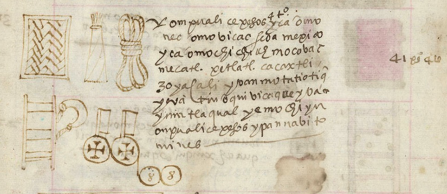cacaxtli (CST44)
This painting of the simplex glyph for the term cacaxtli (wooden carrying frame fitted to the human back) shows a frontal view of what is similar to a three-step ladder. Two ends of a short rope are tied to the right side of the ladder, and the rope forms a loop with a flat more comfortable piece in the middle of the loop, which would go across the carrier’s forehead.
Stephanie Wood
See below for similar carrying frames and an example of how the frame was carried with a load on it. For more on the Codex Sierra, see Kevin Terraciano’s study (2021).
Stephanie Wood
cacaxtli
Stephanie Wood
1550–1564
Jeff Haskett-Wood
marcos, sogas, cargas, transporte, tamemes, madera, transporte, transportador, estructura para llevar cosas en la espalda acuestas

cacax(tli), wooden carrying frame fitted to the human back, https://nahuatl.wired-humanities.org/content/cacaxtli
el cacaxtle, o el cargadero
Stephanie Wood
Códice Sierra-Texupan, plate 44, page dated 1561. Origin: Santa Catalina Texupan, Mixteca Alta, State of Oaxaca. Kevin Terraciano has published an outstanding study of this manuscript (Codex Sierra, 2021), and in his book he refers to alphabetic and “pictorial” writing, not hieroglyphic writing. We are still counting some of the imagery from this source as hieroglyphic writing, but we are also including examples of “iconography” where the images verge on European style illustrations or scenes showing activities. We have this iconography category so that such images can be fruitfully compared with hieroglyphs. Hieroglyphic writing was evolving as a result of the influence of European illustrations, and even alphabetic writing impacted it.
https://bidilaf.buap.mx/objeto.xql?id=48281&busqueda=Texupan&action=search
The Biblioteca Digital Lafragua of the Biblioteca Histórica José María Lafragua in Puebla, Mexico, publishes this Códice Sierra-Texupan, 1550–1564 (62pp., 30.7 x 21.8 cm.), referring to it as being in the “Public Domain.” This image is published here under a Creative Commons license, asking that you cite the Biblioteca Digital Lafragua and this Visual Lexicon of Aztec Hieroglyphs.





